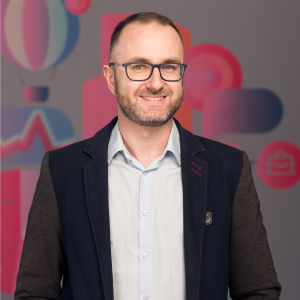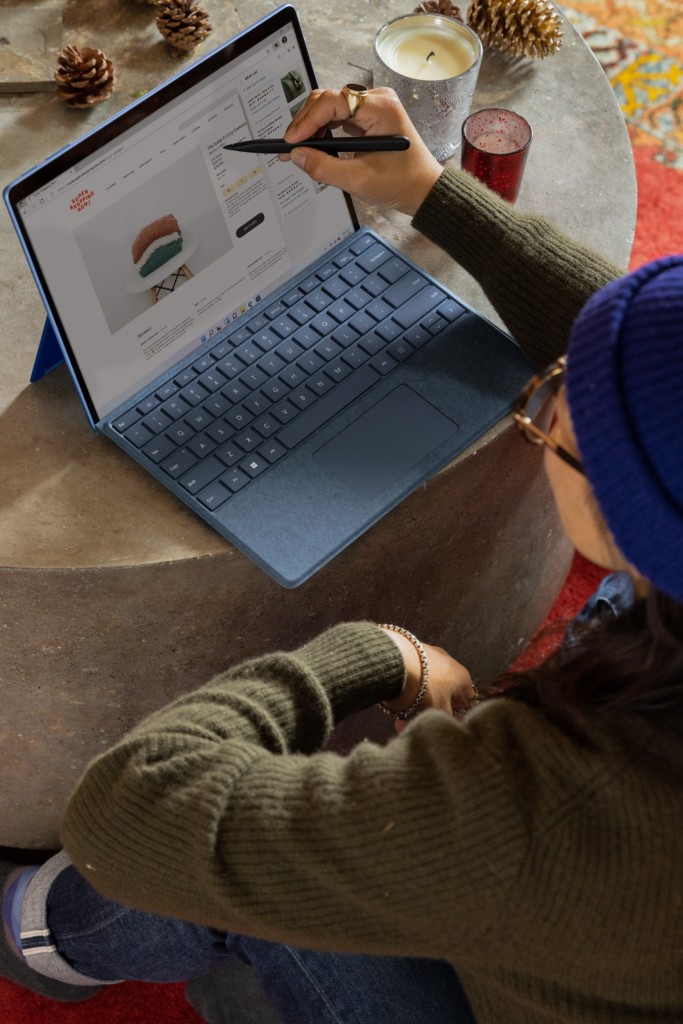How does artificial intelligence change learning?
Since the “Chat GPT” was developed in November 2022, this invention has profoundly impacted the field of education. Students have enjoying, while teachers have scratched their heads, as artificial intelligence fundamentally alters the perception of learning. Whether viewed as the best plagiarism tool, a threat to humanity, or the finest invention of the 21st century, AI has received various evaluations. Following the initial wave of astonishment and approaching the scientific-practical student conference on AI organized by Vilnius Business College, we sought the opinions of our students and teachers on AI: its usage, purposes, challenges, and its implications.
Kristijonas Jankūnas, a first-year logistics business student

“I try not to use AI because I want to use my own mind. I’m skeptical about AI because it makes everything too easy, requiring no effort from the individual. However, I believe it will be necessary in the future. If AI is used for design, logos, it’s a useful tool, but I don’t use it for generating texts. If I need to find information, search for concepts, etc., Google is better suited for that. It’s better to search, read more, and study independently. I see greater benefits in that.”
Ernestas Jancevič, a first-year student in business management and marketing under the “Team academy” method
“AI evokes mixed feelings: I’m glad it exists because it greatly facilitates the completion of tasks related to studies, but it also worries me because as AI improves, we humans become less independent. I personally use AI extensively, especially for lectures related to projects. It’s my assistant when I lack ideas or don’t know which slide to insert, etc.
I believe it’s not necessary to simply copy everything provided by this tool. It’s important to do things according to oneself.
If I’m pressed for time and know I can complete a task using AI, it depends on my motivation and the lecture itself, whether I’ll heavily rely on AI.
And if AI were to disappear, I wouldn’t have any difficulties because this tool emerged recently, and until then, I did everything myself. I would just need to spend more time thinking.”
Victor Eso Orok, a first-year student in business management and marketing
“I think AI is a good tool, but not one hundred percent. I mostly use it to clarify certain words, making it easier and quicker to understand the text I’m reading. If I need to use those words in a written text, I replace them with my own. If it doesn’t work, then I resort to AI assistance. By the way, if there’s someone nearby I can ask, I always prefer human assistance.
Sometimes, when I think about AI, I become anxious because I fear becoming dependent on this tool, unable to find necessary information without it. If AI replaces humans, then it would be truly frightening. That’s why the usefulness of AI is ambiguous.”
Irena Seniut, head of the Foreign Languages Department

“Students certainly use AI, but when studying languages and learning to write, AI hinders rather than helps. First, you need to know what constitutes a good text, written in English or any other language, what its characteristics are. Only then can you use AI because it’s capable of finding phrases, sentences, etc., that need to be corrected in your or the AI-generated text.
During lectures, we conduct an experiment: students and AI complete the same task, and then we compare and analyze the texts. Students quickly notice differences, recognize the AI-written text, and understand that it’s artificial. Often, they realize they write more clearly, beautifully, and interestingly.
For someone who writes well, AI is a good assistant because it helps save time, improve routine tasks, etc. Studying, it’s useful for comparing, analyzing, seeking criticism. However, it’s important to be careful and verify the facts provided by this tool because it creates non-existent references, authors, articles, etc. In such cases, it’s quicker and easier to find information independently.
Using AI depends on the ability to formulate proper queries, which not all students are good at.
As a teacher, my biggest challenge is assessment because I want to evaluate a student’s personal ability, not the contribution of AI.”
Ignotas Mendelis, a first-year student in business management and marketing under the “Team academy” method
“I use AI almost every day for various activities: studies, work, daily life. AI is a source of ideas for me. Later, I use the chosen idea according to myself and do the rest of the work myself.
I think it all depends on how we use AI. If we take everything AI provides us directly without thinking and continue to think for ourselves, I don’t think that’s a bad thing or that it could be harmful.”
Dr. Violeta Jadzgevičienė, head of the IT Department, comments
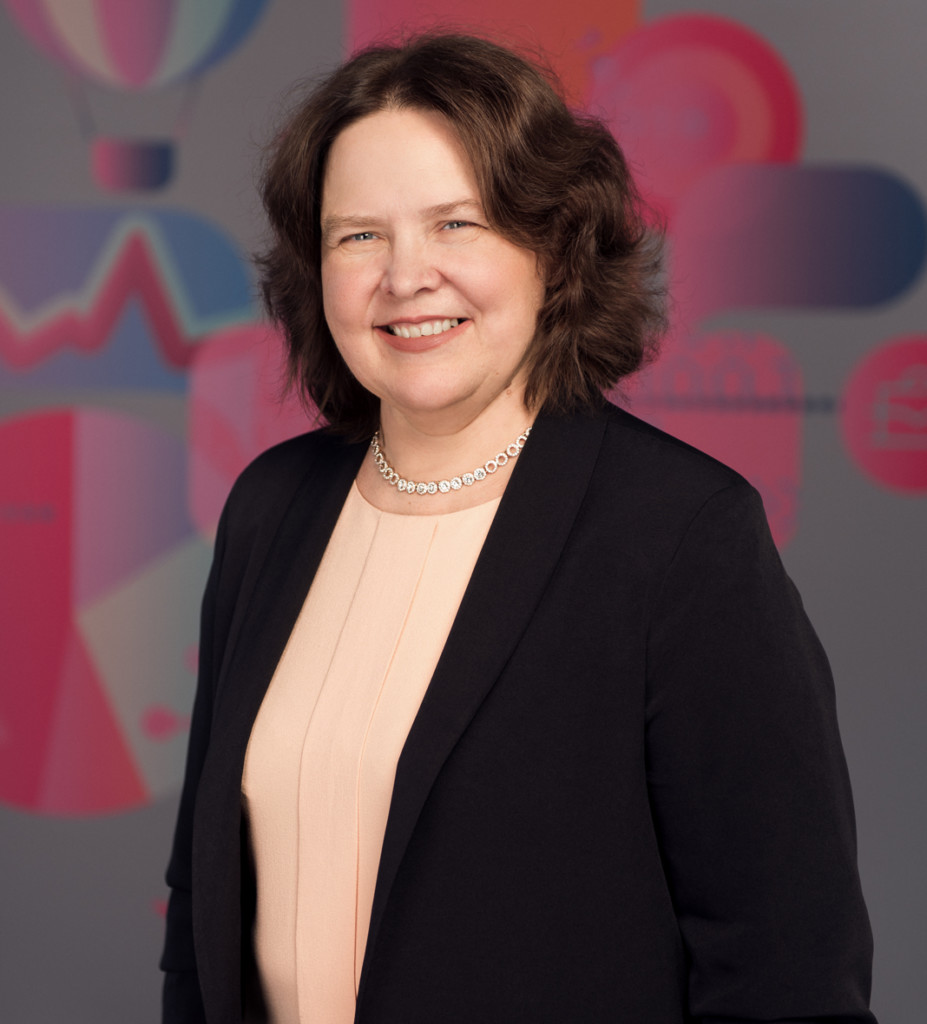
“Students in the IT field extensively use AI, and it all depends on the student. It’s a good tool if you don’t know how to solve a particular task, and AI offers various options. If the student critically evaluates the information provided by AI, searches for sources supporting this information, then that’s great. Of course, as a teacher, sometimes when I look at the result a student provides using AI, I’m slightly disappointed because I see not the student’s but AI’s contribution. Then my biggest challenge arises – how to assess? Another challenge is plagiarism and authorship because a student submits work as their own, although they completed it using AI.
I think in the future, automatic knowledge assessment using tests will disappear. We’ll need a conversation with the student for them to explain their work, to prove they understand.
So I can’t say AI is harmful. You just need to get used to it. It’s also important to understand that AI generates a response based on available information. It doesn’t say “I don’t know.” If it doesn’t know the answer, it creates it from what it has. And that’s not necessarily the correct answer. So AI as a tool isn’t perfect.”
The scientific-practical student conference “Integration of Artificial Intelligence in Higher Education: Challenges and Opportunities” will take place on May 30th from 10 am to 3 pm at Saltoniškių 2. Participation in the conference is also possible remotely.
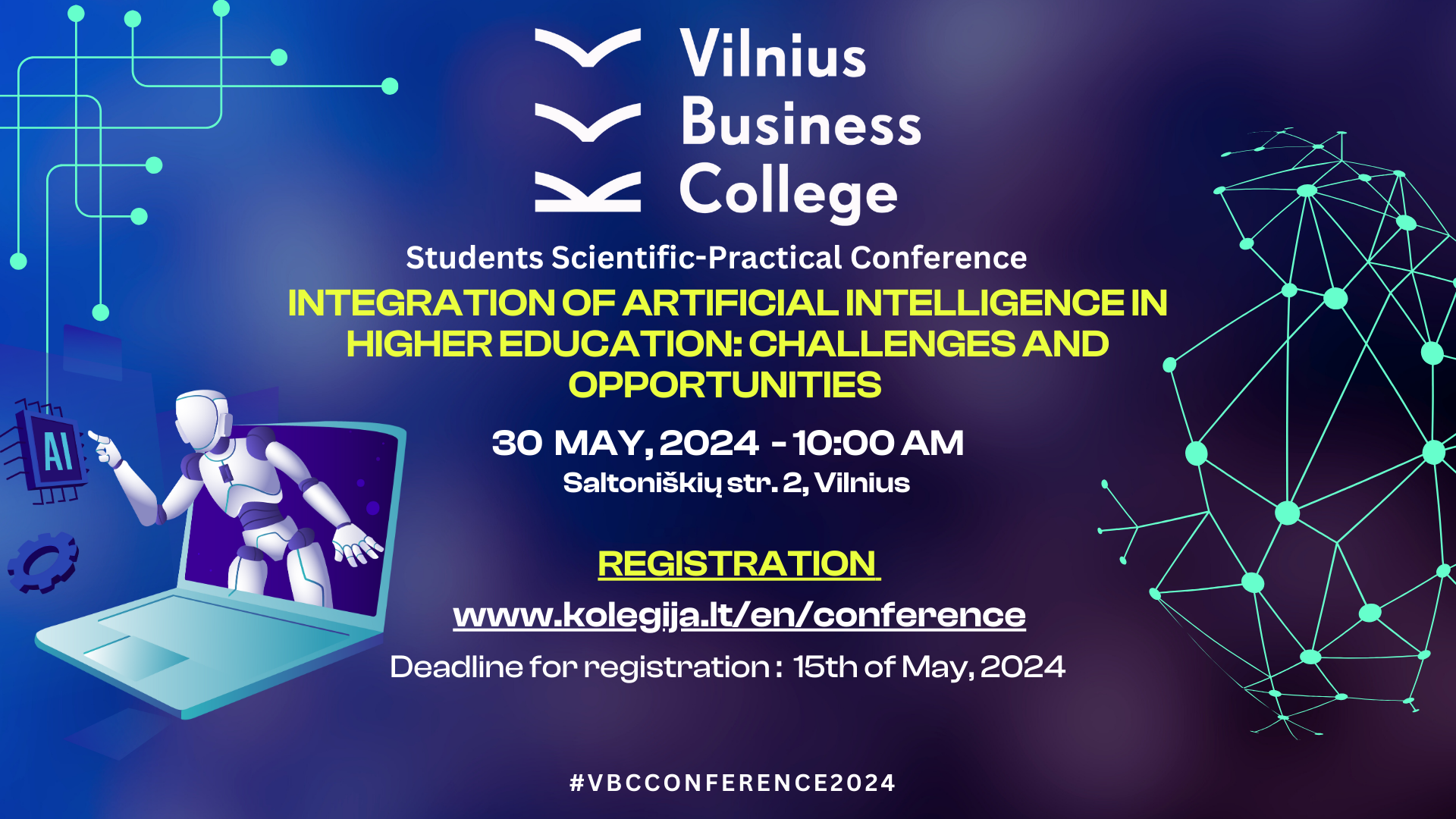
More information – https://www.kolegija.lt/en/conference/
“Design Thinking: What Opportunities Does It Open for Students?”
Design thinking is one of the contemporary disciplines that students at Vilnius Business College are learning. What exactly is this discipline, and how does it aim in students career paths and personal development? We spoke with Vilija Džiovėnaitė, a lecturer at Vilnius Business College, who explained that design thinking is not just about visuals and why it’s very used by startups as well as large companies.
What Is Design Thinking?
Design thinking is a methodology that helps us create changes based on insights from customers, users, or company employees. This methodology encompasses two key aspects: change (we identify and solve a problem using various practices) and the fact that the change is based on the needs of our clients facing a specific issue.
One of the startups of design thinking model is the company “Ideo,” which shifted the perspective that design can solve problems.
Design Thinking: More Than Just Visuals?
In English, design thinking implies action. Identifying a problem, we design, arrange, and construct solutions with students, hence creating a design that can be described as a design of solutions. The methodology itself offers a wide array of tools, so a group of people must think and select which tools are best suited to solve a problem.
How Are Your Lectures Conducted?
Our lectures are not the traditional type where the lecturer speaks and students take notes. They are practice-based sessions. Students come up with a problem relevant to all, define it, and then learn to find solutions using the design thinking methodology, which consists of five stages. While students receive theoretical knowledge about these stages, most of the lecture time is devoted to practice.
Many tools are based on creativity, so during lectures, students develop their creativity through playing, coloring, building, etc. Through such creative construction, discussions, deep dives, and solution searches occur.
How Can Students Apply Design Thinking in Their Future Professional Activities?
The world is constantly changing, and design thinking speaks to change that we can implement very quickly. The traditional business model, where the business itself identifies a problem and obtains a solution from others, no longer works, making design thinking increasingly popular as an effective tool. Its effectiveness comes from continuous collaboration with the client at every stage. By identifying a problem and step-by-step searching for solutions, we continuously involve clients or company employees and receive feedback, finding a solution that truly works instead of being imposed by someone else.
Design thinking is successfully applied in any business that needs ideas and inherently seeks change, from management to business development, from human resources to business risk, etc. Much depends on the specific area of business.
Both startups and large companies seeking changes within the organization or business adopt design thinking as a methodology.
What Else Do Students Learn from Design Thinking Lectures?
Such 21st-century skills as creativity and teamwork are developed, as it’s a team-based practice that teaches listening, voicing one’s opinion, and utilizing various technologies and mobile apps, thus fostering creative technology use competency.
Teamwork is particularly important here, as each team member perceives the problem differently, so students learn to listen to diverse opinions. The more varied the team members, the more unique and unpredictable the solution can be. The team also provides motivation when solution searches take longer.
During lectures, some students learn to dare to voice their ideas and opinions, no matter how strange they may be, while the more active ones, conversely, learn not to overshadow others, to listen. This fosters an understanding that everyone in the team, regardless of experience, maturity, age, personal traits, is equal and that all together, through collaboration, will find a solution.
Can Design Thinking Methodology Be Applied to Personal Development?
Absolutely! For instance, if it’s unclear which career direction to take, what goal to set, or how to achieve it, design thinking methodology can be utilized. Since it’s a clearly defined methodology, it’s applied systematically, step by step. Questions are asked, solutions sought, implemented, then returned to questions about what works, why a conceived solution wasn’t applied, what hindered it, what needs to change, etc.
For example, if a person wants to write, they might ask themselves where they could start writing, whom to write for, what to write about, etc. Thus, step by step, a comprehension of what and how to do is formed.
This way, it’s possible to determine whether the set goal is truly one’s own. Even if the set goal is not achieved, it’s discovered why it happened, what doesn’t work. It’s a path of continuous discoveries, self-reflection, and attempts.
As we see, design thinking only works when applied practically.
First photo – personal archive of V. Džiovėnaitė
Why do Influencers Need a College Degree?
With 35k followers on TikTok, 113k followers on Instagram, and ideas brewing every morning on how to implement them on her social media profiles, that’s Omotolani Enwereji’s daily routine. She enjoys it, she earns from it, so why does a rapidly emerging young woman need a college degree? Omotolani Enwereji shares her thoughts on why she chose to study at Vilnius Business College and how she became an influencer.
Photo – personal archive of O. Enwereji
Real-life situations prompted her to become an influencer
Omotolani came to Lithuania from Nigeria. She already had experience in cinema filming, modeling abroad, and for the past few years, she has been focusing mainly on her influencer career. “The idea of taking this activity seriously came from my experience in Dubai. While waiting with other models for an influencer who was supposed to promote our event, I examined her account, saw what exactly she had to do, found out how much she earned from it. After this incident, I realized that I could do it too. I am confident in front of the camera, communicative, so I decided to give it a try,” recalls the student.
Over the years, she has managed to significantly grow her accounts on TikTok and Instagram (@heytolani), learn a lot, discover her favorite activity, and overcome numerous psychological challenges. Constantly keeping up with innovations and immediately applying them, brainstorming new ideas, fostering her creativity – that’s just one aspect of her work. According to Omotolani, the unseen side of the job, resembling office work, involves communicating with clients via email, learning how to present herself, sorting out tax matters, writing scripts for videos, and more.
“I used to avoid calling myself an influencer because I felt like I wasn’t worth it. Over time, that feeling disappeared. Clients have taught me to trust myself more. If they like my accounts and what I do on them, why should I feel bad?” Omotolani opened up.
Social media activity changed the direction of the girl’s career. Once actively seeking to become a model and earn from it, she says that today she no longer considers a modeling career as the top priority. According to the student, “it is still one of the activities I am engaged in, but my priority today is business and influencer work.”
To Lithuania – for knowledge and a diploma
Business studies in English and a college degree – that’s why O. Enwereji ended up in Lithuania and at Vilnius Business College. Having received a recommendation from a friend, she chose the college because of its business management and marketing study program, international environment where she wouldn’t feel out of place, and modern facilities. Moreover, the girl has always been interested in business, and at the moment she also has ideas she is trying to implement, so she decided that studies would help her do that. “I seek knowledge and a college degree. It’s much better than just courses because a degree shows my education. It’s also a prestige because society values a college degree,” explained the girl the reason she decided to study.
Photo – personal archive of O. Enwereji
O. Enwereji: “I earn from negative comments”
It took only half a year of studies for Omotolani to convince herself that her decision was right because the information received in lectures already helps with both the implementation of business ideas and the influencer career. According to the student, the new knowledge in psychology, personal branding, and economics has been very helpful. By applying them, she noticed an increased reach on social media.
As a businesswoman, the student also appreciates the comments she receives. “Negative comments don’t affect me. Someone always wants to respond positively to negative words, defend, express their opinion, so there is always a discussion after a video or text post on social media. Abundant comments popularize my content, which potential clients see, so I can say that I also earn from negative comments,” explained O. Enwereji.
Adapting in Lithuania goes great
When asked how she is adapting to Lithuania, the student is happy with her study friends and the fact that young people in Lithuania speak English, so it is easy to communicate with them. “I am learning the Lithuanian language, sharing my experience on my accounts, how I manage to live in Lithuania, I constantly learn something new, and study what I like. All of this is very interesting, so I am happy with this experience,” says the student of Vilnius Business College.
5 Fake Facts About Studying FinTech
What are your initial thoughts when you hear about studying programming for financial technology? Do you find it confusing? Do you think you need to have a deep understanding of finance? Are you wondering about job prospects? If so, read on because these questions often arise due to a lack of reliable and clear information. So, what are the misconceptions surrounding FinTech studies?
- FinTech Studies – It’s the First Time I’ve Heard of It, and I Don’t Understand
If you’re hearing about the study program called “Programming for Financial Technology” (or FinTech) for the first time, don’t worry – it’s not unusual. This profession didn’t even exist 20 years ago. What is it all about? In simple terms, a FinTech specialist is a programmer who understands how the financial market works and creates products that many people use. This makes financial services, from savings and investments to cryptocurrency and blockchain, more accessible to a wider audience. Essentially, it’s programming in a specific field, combining programming and financial technology knowledge.
By the way, in Lithuania, FinTech studies are still rare, and Vilnius Business College is possibly the only place where you can study programming for financial technology.
- Do I Need to Be Proficient in Finance to Study?
A FinTech specialist is not a finance expert or economist. You don’t need specific knowledge in these fields. When studying programming for financial technology, you will learn HOW the financial market operates and what financial institutions require. This general information helps you create interesting, sought-after, innovative solutions and products.
During your studies, the main focus is on programming, various programming languages, and modern disciplines like cloud computing, cybersecurity, artificial intelligence, and more. So, whether you have some knowledge of the financial market or none at all, you can confidently study in this program.
- Studying Programming for Financial Technology
Is Very Difficult If programming is a hobby that you dive into, losing track of time, this study program is no more challenging than any other program at Vilnius Business College, such as Programming and Internet Technologies. The difference lies in the content. The programming for financial technology study program prepares specialists for the specific and niche field of the financial market. Dr. Violeta Jadzgevičienė, Head of the IT Department at Vilnius Business College, explains more about it.
4. Will I Find a Job After Graduation?
The FinTech sector is one of the fastest-growing industries worldwide, as more operations and services are conducted in the digital space. Here are some noteworthy facts:
- Lithuania ranks among the top 10 most attractive countries for the FinTech market globally (Global FinTech Index, 2021).
- Lithuania is a European hub with 263 licensed and unlicensed institutions (EUCLID register, European Banking Authority, 2022).
- In 2022, the number of FinTech specialists in Lithuania increased by 18.6% (The FinTech Landscape in Lithuania review by the Bank of Lithuania).
- In 2022, FinTech companies in Lithuania attracted €67.9 million in investments, accounting for 13% of all investments in Lithuanian companies (The FinTech Landscape in Lithuania review by the Bank of Lithuania).
Due to Lithuania’s strong position in the global FinTech market and high demand for employees, FinTech specialists can easily find jobs worldwide. Ričardas Jaščemskis, a member of the Board of the Lithuanian Game Developers Association, also emphasizes the significant demand for these specialists.
- A FinTech Specialist’s Work Is Monotonous and Uncreative
The FinTech sector is incredibly dynamic and ever-changing, providing new challenges and encouraging continuous learning and skill adaptation. Due to the constant and rapid market development, FinTech specialists become innovators, actively involved in creating new technologies and solutions. They need to search for various solutions, analyze data, improve user experiences, create business models, and more. Therefore, creativity expressed through programming is a daily companion.
The FinTech industry operates globally, allowing communication with teams from different countries and cultures, providing an interesting and unique experience. Working in such teams allows you to explore various roles, from a programmer to a project manager.
So, if you have a passion for programming and enjoy losing track of time while coding, FinTech studies might be just the right path for you. Don’t let misconceptions hold you back from exploring this exciting field!
How to Take Care of Your Emotional Well-being During the Exam Period?
I’ll study a bit more and then go to sleep. I’ll complete one more task and then meet with friends. Just a few more pages, and that’s it. If you find yourself thinking like this and the “then” never seems to come, if you’re trying to keep up, learn, and add one more thing to your already busy schedule, then this text is for you. Here are some valuable tips on how to maintain balance during an intense exam session and take care of your emotional well-being, which significantly affects our daily lives.
Plan relaxation time
We’ve all heard about the importance of planning tasks, but the reality is that our schedule is often overloaded with tasks, leaving no room for life. Taking a walk, getting some sleep, listening to music, or exercising are just a few simple and effective gifts to yourself that will help clear your mind.
Set realistic goals
Does a task seem so overwhelming that panic sets in just thinking about it? Don’t know where to start? Break down the task into smaller steps, realistically assess how much time you can complete it, and take small but sure steps towards the goal every day. This will help avoid stress, tension, and disappointment. On the contrary, completing daily tasks will fill your daily life with satisfaction and the perception that you are succeeding.
Communicate
During the exam period, your study friends are the ones who will understand you best, so keep in touch with them regularly. Open conversations about any issues, keep-up emotions will confirm that you are not alone, you have someone to rely on, someone who understands you. Share your emotions with teachers, family members, friends because we are all connected by a common thing – humanity and understanding.
Monitor your feelings
Be attentive to yourself. Our emotions are different every day. If one day you feel tired, allocate more time for rest. Perhaps the next day, you will have more energy, and you can do a little more. Don’t ignore feelings of sadness, apathy, or loneliness, as they are just as valid emotions as joy, happiness, and peace. Identify how you feel and express your emotions to friends and family. You will feel much lighter!
Learn stress management
The exam session can be a great time to start learning stress management techniques that you wanted to try but kept putting off. Breathing exercises, meditation, yoga, mindful self-observation are effective ways to calm down and continue learning with renewed strength. You can find a lot of information on YouTube or special apps on where to start or deepen your knowledge in these areas.
Write
Writing down accumulated thoughts and emotions is a wonderful, time-tested way. It helps to get to know yourself better, understand your emotions, and find ways that specifically help you overcome everything. If it is scary to express yourself to others, a diary will become a reliable friend. Expressing yourself, feeling relief, and continuing what you started will be much easier.
Exercise
Physical activity is an ideal alternative to mental activity, which can be exhausting during the session. Intensive walking, running, gym workouts will help reduce stress, anxiety, tension, and improve mood. If you are lazy or lack the energy to force yourself, exercise for at least 10 minutes and see how you feel afterwards.
Get enough sleep
If you can’t do everything, the first thing you sacrifice is sleep. One or two days with fewer hours of sleep will not harm, but if this becomes your daily routine, the lack of rest significantly affects emotional health. When you are exhausted, you become irritable, magnify everything, criticize yourself more, and feel more dissatisfaction. Quality rest magically solves all this, so don’t feel guilty about sleeping at night!
Allocate time for yourself
At least an hour for yourself doing what you love or simply allowing yourself to consciously do nothing is an extremely valuable gift. It helps nurture your connection with yourself, better understand yourself, hear what your real needs are, and truly relax.
Clarify your priorities and goals
The exam session can be the key to delving deeper and honestly answering the questions of what you want and what you aim for. When you have clear answers, it becomes internal motivation, giving strength when you want to procrastinate, postpone tasks when it seems that you can’t, when it’s too hard. At the same time, it helps to focus all attention and effort on what is truly important to you. In this way, irrelevant things that distract, waste energy, and create a feeling that everything is too much at once are eliminated.
Plan time and tasks
Create and write down an effective time and task plan, including time for relaxation. This will help maintain balance, study productively, and distribute the workload. Such a schedule provides a sense of satisfaction with yourself, self-confidence, good mood, and allows you to enjoy rest without a guilty conscience.
Seek help
If, despite your efforts, everything is just too much, and you feel that it is difficult to cope with overwhelming emotions, seek help. A sincere conversation with teachers or the college administration will help solve things like adjusting the schedule of assessments. Visits to a psychologist will reduce stress, get to know yourself better, and find ways out of the situation. Seeking help is an expression of self-love when you accept how you feel and take care of yourself.
Remember that everyone is individual, so try different ways of taking care of your emotional well-being until you find what helps you the most at the moment. And not just during the exam period but every day!
How does participating in the Erasmus+ programme benefit my CV?
My Success Story: How VBC Students Became Lecturers
Is it possible to become a lecturer when you start your studies in college? How do entrepreneurs transition into the teaching profession and leave their business behind? When does the moment come when your studies lead you to inspiration to learn more and have the courage to take on new challenges? In this blog, we present two real stories about Vilnius Business College students who became college instructors. How did they make it?
The only one without a diploma among everyone with degrees
“When I first entered the lecturers’ room, it felt strange. I entered not as a student but as a lecturer. I was equal amongst them. I will never forget it,” says Vytautas Šulus, an alumnus of Vilnius Business College who became a lecturer more than five years ago.
After a high school, Vytautas dived straight into the business world, and he first sat in a student’s desk at almost thirty. The reason was his employees, who all had an education except for him, the business owner. Understanding that he felt out of place and that he needed to study, Vytautas decided to study programming as he was already seriously interested in computers at that time. He chose extended studies at college as the best option for him.
“I came to study, and I never regretted it for a second because it gave me a lot in life and education and became a strong reason to continue learning. Studying at an older age benefited me because I knew better what I wanted,” said V. Šulus.

Photo from the personal archive by V. Šulus
Education and career shift
Studying at Vilnius Business College inspired Vytautas to open another company dealing with computer maintenance and sales, which was the business he always wanted. Motivated by his studies and his favorite IT field, he later studied business informatics and cyber security studies and obtained a master’s degree. While still running his business, Vytautas regularly took on many interns who he had to teach quite a few things. That’s when he realized that he had a lot of knowledge and the desire to share it. This naturally led to the idea of becoming a lecturer.
“I wrote to my thesis supervisor, Violeta Jadzgevičienė, who is also the head of the IT department, and thus, I returned to Vilnius Business College, but this time as a lecturer. Vilnius Business College is a very friendly institution that cares about its students. I have a lot of respect to my college and all the community there, so I feel a strong desire to give back since it gave me an opportunity to learn,” he commented his career turn.

Vytautas Šulus: “The students don’t let me to get old “
Currently, Vytautas Šulus teaches courses in cybersecurity and operating systems at our college. Teaching has become his main job, pushing his business to the background. He takes great pleasure in sharing his knowledge and experience, and is a popular lecturer amongst students. He is thankful to the young people for not letting him to get old. “Teaching is constant self-improvement. I have to be ready to answer all students’ questions, so I need to be curious, stay updated on innovations, and think deeply. When I interact with students, I am not just their lecturer; I am their friend and helper. I believe everyone has the potential to learn and succeed. The key question is whether the student wants it, and that’s very clear when standing in front of the class,” Vytautas Šulus notes.
Transitioning to teaching after receiving the professor’s approval
Laimonas Matukas is another alumnus of Vilnius Business College who studied programming and returned to the college in the autumn of 2023 as a lecturer. An experienced programmer, he received an offer to teach Java programming at our college and decided to give it a try after consulting with his father, a professor at Vilnius University. “I received the answer that teaching is a wonderful experience that has much to offer. I decided to give it a go. Although only a short time has passed, I can confirm that teaching at the college is genuinely interesting,” says Laimonas Matukas.
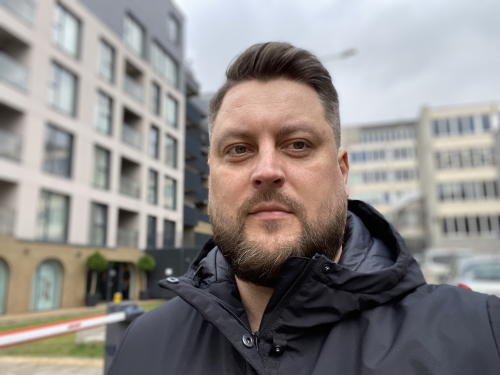
Photo from the personal archive by L. Matukas
Understanding that experience alone is not enough
Laimonas Matukas, in his earlier years, did not rush to get a diploma and instead, dove headfirst into programming, not caring about his education. He developed a lot of experience, and various courses helped him along the way. However, there came a time in his life when it was evident that he needed education. After finding a kindred spirit and his fate-friend, he started looking for where and what to study. Extended studies and an appealing program (Programming and Internet Technologies) were the reasons why both chose Vilnius Business College.
“I knew a lot about programming, so studying wasn’t difficult. What was new and change my perspective of thinking was the projects and their management. These skills were truly beneficial for me in my job,” recalled the alumnus. After receiving his diploma, he continued his work and taught in one academy.
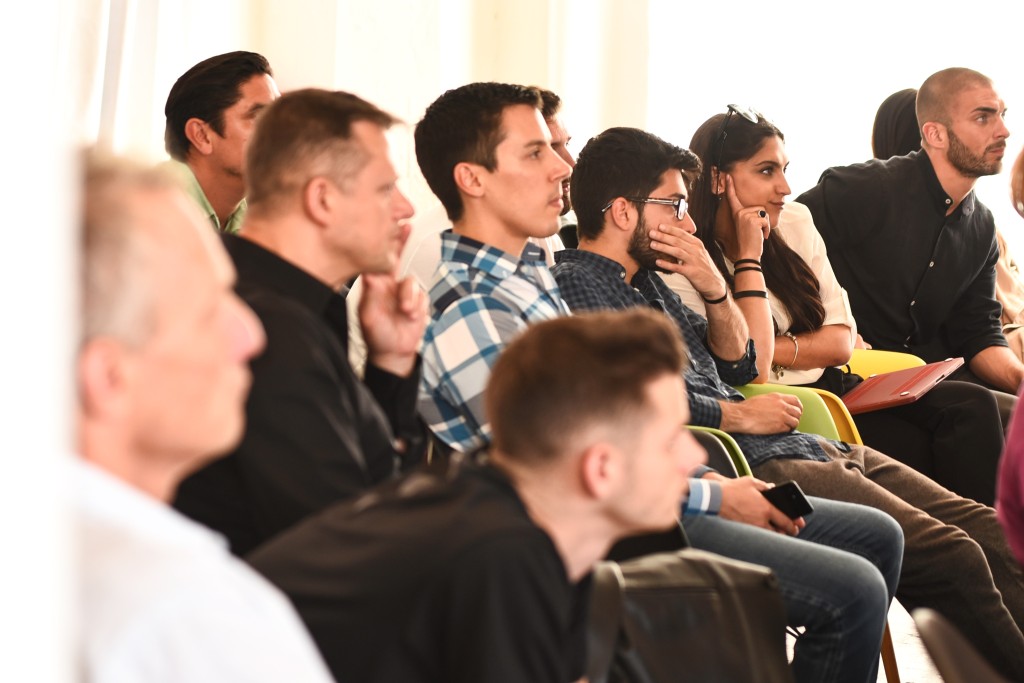
Teaching motivates ongoing self-improvement
When asked how it feels to teach at the same educational institution where he studied, Laimonas Matukas first mentioned the motivation of the students: “College students put in a lot of effort, even if they don’t always show it openly.” The challenge for him was to make the lectures engaging and beneficial for students with different levels of expertise. “It seems like I know a lot, but the questions students ask force me to follow the latest trends, delve into nuances, and think critically. I’m glad that working at the college forces me to continuously improve my knowledge in the field,” Laimonas Matukas concluded.
I am an International Student Studying at VBC
Mannh Kamble came from India. Business management and marketing are already the second study programme which he studies in Lithuania. Who brought him from hot India to Lithuania, where he is counting the sixth year of his life? Mannh talks openly and honestly about his studies, cultural challenges and why living in a foreign country so strongly teaches us to live in the present. For your attention – an interview with our college student from abroad!
How did you end up at the Vilnius Business College?
Engineering studies brought me to Vilnius, but my old dream of working for myself and creating my own business did not leave me. I decided to take a break and once on my way to work I saw the inscription “Vilnius Business College” on a huge building. I got interested, read more, went to talk and…I was hooked. I was attracted by the study program, informal, warm communication, and an environment that does not resemble standard classrooms. The gap year I had planned ended very naturally before it even started. It felt like everything fell into place by itself.
And what is the study experience like after the first year?
Great! The first semester was very addictive because the studies are interactive. Instead of constantly reading a pile of books before, here the learning process is gradual and with a lot of practice. You need to read books, but the teacher can give you the task of finding the desired literature on a certain topic. We also pay a lot of attention to what is happening in business and in a particular field, not just in general, but at the moment, how it relates to the subject of study. And this is the case in all lectures, so studying is interesting.
My group mates are smart and cool, I really like them. I even work with some of them in the same job.
How did you manage to adapt in Lithuania, a completely new country for you?
I have been living in Vilnius for six years, so I am no longer a newcomer. When I was preparing to go to Lithuania for the first time, I was not too interested in the country, because the most important thing for me was my studies. Now it’s fun to remember when family members, just 30 minutes before leaving for the airport became interested in the climate of Lithuania and, seeing -20 C, rushed to look for warm clothes. Men’s or women’s jacket – it didn’t matter anymore! The housemates were also worried about the Indian food that I am used to.
I like Vilnius. I made friends from my previous studies, and later, in order to get to know Lithuanians better, I tried various methods, for example, talking to a stranger in the city every day. And I was successful! I also found friends with the help of my girlfriend. Currently, my circle consists of Lithuanians and foreigners, I have no friends from India.
When I could find a job, I found it on the Internet, social media with the help of networks. The fact that I am trying to learn to speak Lithuanian helps me a lot. I can now talk about simple everyday things.
What cultural challenges did you face?
What was new was that people in Lithuania value personal space much more. I like that Lithuanians are quite straightforward people: they don’t mince words, they say it as it is. When you find a Lithuanian friend, you know that he is real and reliable.
In India, I was used to a huge variety of languages, customs, religions, etc. diversity, and this is not the case in Lithuania. However, you get used to everything, even the Lithuanian weather, because after summer the temperature does not immediately drop to -20. The weather cools down gradually, and everything is saved by the right clothes.
What would you advise to our new students which considering studying at the Vilnius Business College?
Be open. The most important thing is to stay focused on your long-term plans, to be active every day. Study as many different subjects as possible, make the most of all the opportunities – that’s how your studies in Lithuania will be memorable. If you see an opportunity, such as a job offer on LinkedIn, don’t hesitate to give it a try.
It is very important to make as many contacts as possible and to learn the Lithuanian language. Local people, seeing your efforts, will be happy to help.
When you come to Lithuania, don’t compare it with your country. It doesn’t do anything and it doesn’t help in any way. You cannot have one foot in Lithuania and the other in your home country. You have to live in the present, here, where you are now, in Lithuania.
Thanks to Mannh Kamble for the interview! We wish you success in your further studies!
“Fintech” Specialist: Who is it for and What are the Prospects?
What do you know about fintech? That it is about the financial market and technology? That it is viable and modern? That’s all? If you see yourself in the IT field, read this text to find out more about the fintech niche and to see if it is the right study and career path for you.
Why is Lithuania called a fintech paradise?
The fact that Lithuania has created very favourable conditions for the development of the fintech sector and that this is recognised and appreciated globally is still a little known fact. Meanwhile, the numbers are telling:
- Lithuania is among the top 10 most attractive countries for fintech worldwide (Global fintech index, 2021).
- Globally, Lithuania is known as the centre of this market in Europe and the EU is leading the way in terms of the number of licensed companies (“EUCLID register”, European Banking Authority, 2022).
- There are currently as many as 265 licensed and unlicensed fintech institutions in Lithuania (Invest Lithuania, 2022).
- The number of professionals working in the financial services sector is growing by as much as 11% each year (Invest Lithuania Fintech, 2022).
- Lithuania has a friendly and highly collaborative fintech community to support young/existing companies and professionals.
Who is a fintech professional?
A programmer who understands how the financial market works, the technology it uses and the products it requires. They have knowledge of financial market risks, regulation, security, blockchain technology, artificial intelligence, cloud engineering, money laundering schemes, even the prevention of terrorist financing, etc. Employers highly value knowledge in these areas, so it makes the entry into the fintech market much easier and quicker.
The ability to learn continuously, to show initiative, to communicate, to plan work and time, to be patient and attentive – developing these personal qualities is equally important for the success of projects and for teamwork.
Working in fintech is seen as the profession of the future, with jobs in areas such as digital banking, cryptocurrencies, insurance, mobile money transfers, personal finance, stock trading apps and more. There is no doubt that other new job opportunities will emerge in a constantly evolving market that are only just being considered today.
How do I become a fintech professional?
The steady and rapidly growing fintech market in Lithuania and around the world creates a strong demand for new professionals, but there is a severe shortage of higher education institutions in Lithuania that can train such professionals. “Vilnius Business College is one of the first higher education institutions to prepare a study programme that focuses on the development of financial technologies,” says Dr Violeta Jadzgevičienė, Head of the Department of Information Technology.
According to the data of the magazine “Ratings” in 2023, Vilnius Business College is ranked first among colleges in the IT field of study. With a strong team of experienced lecturers, in close cooperation with social partners and knowing the real market demand, Vilnius Business College has launched a new study programme in 2023 – Programming for Financial Technologies.
“This study programme does not require prior financial knowledge. We are training a programmer who acquires knowledge about the specific financial market,” emphasises Dr. V. Jadzgevičienė.
Priority to practice and knowledge based on real market needs means that students who have obtained a higher education diploma and started their career in fintech have a good understanding of what is happening in the market and successfully apply the knowledge they have acquired, rather than re-learning in a new workplace because their studies were too theoretical. Employers appreciate this, as Vilnius Business College has been consistently leading in terms of the added value created by alumni and in terms of employers’ evaluation every year since 2013.
Students Realise their Dreams Through Business
Still studying and already have your own company? This is the daily life of Team academy students. After coming up with a business idea, setting up a company and warming up their feet in the first year, they study business management and marketing in the second year to develop their own businesses. So what are the Team academy students’ businesses and how are they doing?
G. Baltmiškytė after several attempts, established itself in the field of beauty
Gintarė Baltmiškytė knew she wanted to earn money and work for herself. On her own terms and on her own schedule, not on someone else’s. Having tried to work at beauty industry several times since leaving school, this time she put her knowledge into practice and gave a new lease of life to her studio, where she provided manicure, pedicure and eyebrow correction services.
“I learned about business during my studies. I started working for fun, not for money. I focused on quality and diligence. It’s not so much about the number of clients, but how and what kind of manicure or other service I give. And I started to succeed. I have regular clients who are happy with the results of my work,” says the student about the changes in her business.
With more than 10 different certificates proving her professionalism in her chosen field of beauty. “I might not have created this business if the very principle of the training method did not require it. In my second year, I got the courage to find out that a solo business was my preferred option. I realised from meeting different entrepreneurs and companies that it is often difficult to get started, that I am not alone, and that I just have to put in the effort and not just rely on bad experiences,” the young entrepreneur shared her discoveries from her studies. In the future, she wants to expand her business and employ other people.
Baltmiškytė offers her services in a studio next to the college campus (Kalvarijų g. 127). Book a service and see examples of her work on her Instagram account @polarnails_.
M. Šalkauskas seeks to change attitudes towards cannabis products
Mantas Šalkauskas is a cannabis product enthusiast who has been dreaming of selling cannabis products for about 10 years. The change was prompted by favourable legislation and… studies at Vilnius Business College. Setting up an e-shop, selecting products, starting up – the student had to work hard to make his dream come true. Education is also important to him, as Mantas aims to change people’s attitudes towards cannabis. For this, he used his e-shop and invited another business study programme student, Kipras Išganaitis, to manage his social networks.
“During my studies, I developed a different attitude towards many things. I realised how important it is to plan your agenda, to learn how to work in a team (which was harder for me before), to understand human psychology. It’s interesting to be able to apply the knowledge I’ve gained right away. We recently learned about surveys, we did them in our own business and it turns out that everything works,” shares M. Šalkauskas.
Doing business in such a changing field, with a lot of changing information and laws, is both challenging and motivating. In the near future, the students plan to recruit a third person, and their future plans include a physical store and expansion in Europe.
For cannabis products sold by M.Šalkauskas and K. Išganaitis, visit www.cbdpasaulis.lt
R. Aleškevič: through sweet gifts to the work you love
Robert Aleškevič is also an e-commerce entrepreneur, selling personalised festive chocolates. “I want this business idea to survive and the business to grow,” says the student. One of the first in his course to boldly and responsibly start his own business, Aleškevič had to set up an e-shop, take care of various permits, find a warehouse and other tasks. While in his first year he and his classmates used to argue for three weeks about the name of the company, today he gets much more done in the same time. “We had to get to grips with what the main jobs were, as well as obtaining and applying knowledge about sales and business development,” recalls the boy, whose solo business has now moved on to the next stage.
The student is working hard on a new version of the website and will offer more choice to customers looking for personalised gifts: in addition to chocolates, he will also sell albums, puzzles, souvenirs. In order to have more finances to expand his business, he found a job and entrusted the administration of the social networks to another business field student, Ugnius Gedžius.
“Owning my own business is a dream I’ve carried for many years. I want to have a job that I enjoy,” says Aleškevič.
For personalised chocolates and other gifts, visit www.ardovana.com
We are proud of our students and invite you to support their businesses!






















